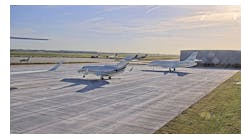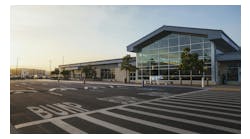May 16—Ongoing efforts to turn Purdue University and its 400-acre Discovery Park District into a testbed for emerging 6G technologies have made major progress in recent months, including planning, construction and research partnerships, officials say.
According to David Broecker, chief innovation and collaboration officer for the Purdue Research Foundation, the dream of turning the district into a tech research hub has been years in the making, but plans didn't begin to materialize until after the peak of the COVID-19 pandemic. Now, he said, the district is really taking shape, through capital projects such as the construction of wellness-focused residential developments, as well as tech upgrades to Purdue University Airport, both announced in March.
Broecker said these announcements are among the major milestones in Purdue's Lab to Life initiative, first announced in 2021, which plans to attract private tech industry partners to the university in order to spur research and development efforts in emerging tech fields such as autonomous technologies, advanced semiconductors and artificial intelligence, as well as to turn Discovery Park into the country's first at-scale 6G network deployment zone. He added that nearly 70 percent of Discovery Park has been committed for capital projects.
"We're ahead of schedule building out [the district]. There are more homes planned, more residential spaces. We're planning more retail now. But we're now looking at the district as a community, like a Central Park kind of area," he said. "In the middle of the district, we've got a hospital that's committed ... We have manufacturers looking to bring in semiconductor manufacturing companies. All of these things are on the plate right now.
"I would say in the next two years, hopefully — if we can get even half of these plans executed — we'll probably be up to close to 3,000 people or more, and many more companies."
The tech company Ericsson has contributed a private 5G network for the Purdue Research Foundation to operate the airport, which is the state's second busiest. To help smooth out daily operations there, Saab also promised a new system called Aerobahn, which an announcement said "unlocks airport efficiency" for airlines and ramp management. In addition, Saab pledged to provide the facility with SAFE event management, which is used in airport operation centers, as well as ADS-B sensors to track the 125,000-plus aircraft that come through the airport and improve operational safety. Those upgrades will be combined with a 60,000-square-foot hybrid electric/controls facility, added to Purdue Technology Center Aerospace through another recent partnership with Rolls-Royce. The goal in these partnerships, officials said, is for the airport to be part of Purdue's research ecosystem, "where cutting-edge technologies are deployed before any other locations in the country."
"Purdue University is the perfect location for this project to innovate airport management," Purdue President Mung Chiang said in the announcement. "Purdue has established longstanding partnerships with Ericsson and Saab, two Swedish innovators and global tech leaders. Purdue University Airport is one of the handful of airports operated at a research university in the U.S. And Purdue's Discovery Park District, next to our airport, has provided a lab-to-life ecosystem where cutting-edge technologies are deployed before any other locations in the country. No other location is better suited for these exciting 5G innovations and network management solutions that will impact people's lives around the globe."
Broecker said the airport will be a place to advance aviation technology, including drones, as well as security innovations and other tech tools in the years to come.
"Now, it's really about exploring interesting use cases where we can start to apply the technology and the infrastructure, so we're working with faculty on a lot of mobility-related projects. [Autonomous transportation] is a big topic when it comes to these networks ... we have a bunch of robots that go across campus," he said. "Thinking about integrated mobility solutions is on our list, and there are people that are interested in doing research in that area. The Saab partnership has really been opening up a lot of safety and [tech development opportunities] not only at the airport, but in how we can also use technology built to monitor traffic."
Through work with other companies such as AT&T, Celona, Cisco, Dell, Intel, SBA Communications and Tilson, Broecker envisions the district and university acting as a smart city tech incubator. He noted that the district will be built with input from the university community, with a focus on the "human side of technology." He said the university looks to avoid situations such as in Toronto, where officials received backlash over plans to outfit the city with smart city technologies many considered to be invasive or overzealous in terms of surveillance capabilities.
"One of the things that we found when we studied smart city tech applications is that if you lose the trust and confidence of the community, they can view this technology either very skeptically or worse, suspiciously," he said. "The [Toronto] community became really suspicious and ultimately turned off on the idea of what was happening ... we want to avoid that."
___
(c)2023 Government Technology
Visit Government Technology at www.govtech.com
Distributed by Tribune Content Agency, LLC.




